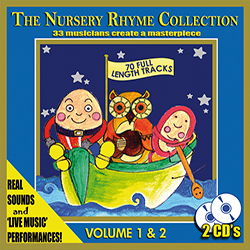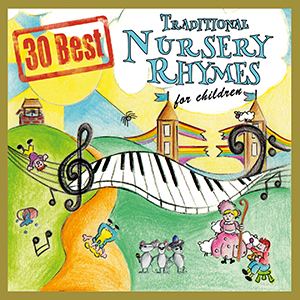The Nursery Rhymes Collections 1-4 contain a total of 277 children's songs. Each double CD album showcases the highest quality children's music ever recorded with a total playing time in excess of 10 hours!
See Saw Margery Daw (Full Audio and Lyrics)
See saw Margery Daw
Jacky shall have a new master
He shall have but a penny a day
Because he can't work any faster
See saw Margery Daw
Jacky shall have a new master
He shall have but a penny a day
Because he can't work any faster
Words & Music: Traditional
Arrangement: Ian J Watts/Mike Wilbury
Origin and background
There are several nursery rhymes included in this collection which are said to deal with poverty at the beginning and during the Industrial Revolution, especially amongst children. (e.g. See Saw Margery Daw, Little Tommy Tucker, Girls and Boys Come Out to Play). If we take into account the money paid to ‘Jacky‘, he/she would seem to be a child, because only children earned so little money and only children could work for such little money. A penny a DAY was really very little even in those days.
For a young boy chopping wood the going rate was 1 ½ pence PER HOUR, while a porter could expect a penny for shifting a bushel of coal. A waterman would expect six pence to take you from Westminster to London Bridge, while a barber would have asked for the same.
source: http://www.oldbaileyonline.org/static/Coinage.jsp
Concerning Tommy Tucker, it is very plausible that the song is about poor working children, therefore we are really surprised by the sardonic tone of See Saw Margery Daw, and the fact that the child is blamed (“can’t work any faster“), instead of blaming the social situation which obliged children to work.
However, in the case of See Saw Margery Daw, there is an alternative theory regarding the origin of the song. It is well possible that the song was originally used to help keep rhythm when men worked with a two person saw - fitting very well to the movement of two children rocking on a seesaw. We see a phemomenon that occurs quite often: A song can become completely independent from its initial meaning (e.g. Gospel Songs like "She’ll be coming down the mountain", "Sweet Lord, sweet chariot"). It can happen as well that the circumstances in which a song is originally sung change completely. Today, of course, See Saw Margery Daw has simply become a children's song. Noboby is aware any more that initially it may have been about working children or a rhythmic chant used by workmen.
The assertion made by George Orwell, the famous author of ‘1984‘, is completely correct:
In many languages, it is said, there is no nonsense poetry, and there is not a great deal of it even in English. The bulk of it is in nursery rhymes and scraps of folk poetry, some of which may not have been strictly nonsensical at the start, but have become so because their original application has been forgotten. For example, the rhyme about Margery Daw:
See-saw, Margery Daw,
Dobbin shall have a new master.
He shall have but a penny a day
Because he can’t go any faster.
source: http://ebooks.adelaide.edu.au/o/orwell/george/o79e/part29.html


